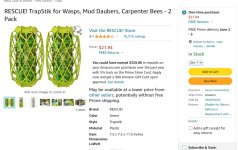lenmann
Well-Known Member
- Joined
- Apr 13, 2013
- Messages
- 1,693
- Reaction score
- 3,512
@DaytonaBabe is your pool a salt sanitized pool? The salt is like crack cocaine to bees.
Here's a short (edit: shortish) story about my recent relationship with bees:
I retired to rural way NorCal, built my dream home, with a salt pool included. What I didn't know is that the bucolic cattle ranching town I settled in is also a bee raising mecca dating back to the late 1800's. I am talking 5 generations of Italian queen honey bee breeders with the core gene pool passed from generation to generation, sibling to sibling...
My 10 acres of paradise backs to a 150 acre agriculture preserve set aside for bee hiving, breeding, honey harvesting and what ever the fuck else you do with bees if bees are your business.
In the 6 years I have lived here I have learned a LOT about bees.
Starting in March when the hives return from the annual great almond pollination palooza in the CA central valley, 200 hives are parked on the other side of my fence to forage spring pollen. Bee hives need a substantial amount to water to maintain the health of the hive, assure reproduction of bees, and enable the production of honey. In fact certain bees in every hive are assigned specific jobs. Pollen collectors collect pollen, water collectors do the same with water. Drones protect the hives. Queens make baby bees. Every bee has one job, no bee is cross trained. I am sure I have neglected a couple of the bee crafts and professions, I'll blame the Manhattan I am sipping currently. Apologies to the overlooked.
Instinctively the water collectors seek out ponds, creeks and other natural sources of water to fill the needs of the hive. In dry times responsible bee keepers provide water sources very near the hives to satisfy the bees water needs. If the barrels or tubs of water are placed late or not kept filled the bees will seek alternative sources. Think biological imperative here, they really need water, bad. Often the alternate source is a nearby residential swimming pool. Once one of the water collectors finds a pool he/she/it tells all the other water collectors and, bam, that's the new watering hole. They will each return 100's of times each day until the source dries up, the cycle is interrupted (insecticide), or they die at 5 weeks old. Every time they make the trip to my (or your pool) they tell all their buddies and leave a pheromone trail right to your shamu shelf or beach entry. Even if the water tubs are refilled they will simply repeat their last route back to the pool, literally flying over the closer water source.
Every bee keeper I have spoken to says that salt pools are impacted the worst (Crack Cocaine for bees). All suggested that I switch to conventional liquid/tab chlorine or UV light disinfection. All said they work hard to make sure their water sources are kept full to help avert the need to seek out alternative water sources. All that said we have had a couple of years where the swarms of bees at the dual beach entries in our pool looked like something from a horror film. I am talking thousands of bees flying in, stopping to drink, and flying out.
I have not switched away from salt yet. For me the benefits of salt outweigh the bee issue, at least so far. I now have grandkids so the priority may be shifting. In our part of the bee world once the temps start consistently hitting the mid 90's the pollen supply dwindles and the keepers start moving the hives to cooler temps in Oregon. That usually happens by fathers day so we hav a bee free July through September.
Anyway, that's a lot of bee bark to digest.
Another note: the bee lines that are raised here locally all trace their roots back to a very gentle line of queens imported from Italy in the 1800's. in the 6 years we have been living with the bees nobody has been stung. I have personally walked through the swarm multiple times to cool off on hot May day so on some level I have figured out how to co-exist. My wife on the other hand...
Here's a short (edit: shortish) story about my recent relationship with bees:
I retired to rural way NorCal, built my dream home, with a salt pool included. What I didn't know is that the bucolic cattle ranching town I settled in is also a bee raising mecca dating back to the late 1800's. I am talking 5 generations of Italian queen honey bee breeders with the core gene pool passed from generation to generation, sibling to sibling...
My 10 acres of paradise backs to a 150 acre agriculture preserve set aside for bee hiving, breeding, honey harvesting and what ever the fuck else you do with bees if bees are your business.
In the 6 years I have lived here I have learned a LOT about bees.
Starting in March when the hives return from the annual great almond pollination palooza in the CA central valley, 200 hives are parked on the other side of my fence to forage spring pollen. Bee hives need a substantial amount to water to maintain the health of the hive, assure reproduction of bees, and enable the production of honey. In fact certain bees in every hive are assigned specific jobs. Pollen collectors collect pollen, water collectors do the same with water. Drones protect the hives. Queens make baby bees. Every bee has one job, no bee is cross trained. I am sure I have neglected a couple of the bee crafts and professions, I'll blame the Manhattan I am sipping currently. Apologies to the overlooked.
Instinctively the water collectors seek out ponds, creeks and other natural sources of water to fill the needs of the hive. In dry times responsible bee keepers provide water sources very near the hives to satisfy the bees water needs. If the barrels or tubs of water are placed late or not kept filled the bees will seek alternative sources. Think biological imperative here, they really need water, bad. Often the alternate source is a nearby residential swimming pool. Once one of the water collectors finds a pool he/she/it tells all the other water collectors and, bam, that's the new watering hole. They will each return 100's of times each day until the source dries up, the cycle is interrupted (insecticide), or they die at 5 weeks old. Every time they make the trip to my (or your pool) they tell all their buddies and leave a pheromone trail right to your shamu shelf or beach entry. Even if the water tubs are refilled they will simply repeat their last route back to the pool, literally flying over the closer water source.
Every bee keeper I have spoken to says that salt pools are impacted the worst (Crack Cocaine for bees). All suggested that I switch to conventional liquid/tab chlorine or UV light disinfection. All said they work hard to make sure their water sources are kept full to help avert the need to seek out alternative water sources. All that said we have had a couple of years where the swarms of bees at the dual beach entries in our pool looked like something from a horror film. I am talking thousands of bees flying in, stopping to drink, and flying out.
I have not switched away from salt yet. For me the benefits of salt outweigh the bee issue, at least so far. I now have grandkids so the priority may be shifting. In our part of the bee world once the temps start consistently hitting the mid 90's the pollen supply dwindles and the keepers start moving the hives to cooler temps in Oregon. That usually happens by fathers day so we hav a bee free July through September.
Anyway, that's a lot of bee bark to digest.
Another note: the bee lines that are raised here locally all trace their roots back to a very gentle line of queens imported from Italy in the 1800's. in the 6 years we have been living with the bees nobody has been stung. I have personally walked through the swarm multiple times to cool off on hot May day so on some level I have figured out how to co-exist. My wife on the other hand...







